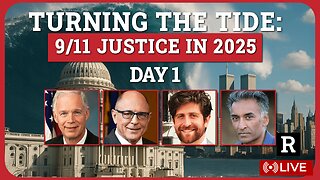Premium Only Content

History of Germans in 5 minutes
History of the Germans
Chronicles of Germanic Heritage
Welcome to our channel! Today, we're diving into the History of the Germans, exploring their profound impact on European history and culture.
Early Germanic Tribes
The Germanic tribes, including the Ingaevones, Istvaeones, and Irminones, each had unique cultures and languages. The Suebi were known for their military strength and interactions with the Romans, while the Cherusci, led by Arminius, famously defeated the Romans in the Battle of the Teutoburg Forest in 9 AD, symbolizing Germanic resistance.
Goths and Vandals
The Goths, divided into Ostrogoths and Visigoths, played crucial roles in the fall of the Western Roman Empire, with the Visigoths sacking Rome in 410 AD. The Vandals migrated from the Baltic to North Africa and sacked Rome in 455 AD, establishing a powerful kingdom.
Migration to Britain
The Angles, Saxons, and Jutes migrated to Britain during the early medieval period, significantly influencing the cultural and linguistic development of the British Isles.
Technological Advances
The transition to the Iron Age brought significant technological advancements, improving weaponry, tools, and overall economic and military capabilities.
Cultural and Religious Syncretism
As Germanic tribes interacted with other cultures, they blended Roman, Celtic, and indigenous beliefs, creating a unique religious landscape.
Migration Period
The movement of Germanic tribes across Europe spread their languages and cultural practices, contributing to the fall of the Western Roman Empire.
Ancient Germanic Societies
These societies had unique social structures and beliefs about the afterlife, like Valhalla and Hel, and were influenced by Celtic art and religion.
Roman Influence
Roman interactions introduced writing systems and urbanization to Germanic tribes. Key events include:
Battle of the Teutoburg Forest (9 AD): Arminius and the Cherusci ambushed and defeated three Roman legions.
Marcomannic Wars (166–180 AD): Showcased Germanic military strength and led to peace treaties.
Migration Period (4th to 6th Century): Germanic tribes migrated into Roman territories, contributing to the fall of the Western Roman Empire.
Theoderic the Great (493–526 AD): Theodoric, leader of the Ostrogoths, established a kingdom in Italy, blending Roman and Germanic governance.
Spread of Germanic Tribes
Germanic tribes like the Visigoths, Vandals, and Anglo-Saxons migrated and established kingdoms throughout Europe.
Formation of Early Germanic Kingdoms
These tribes formed kingdoms, such as the Ostrogothic Kingdom in Italy, Anglo-Saxon kingdoms in Britain, and the Visigothic Kingdom in Iberia. The Frankish Empire emerged under Clovis, who converted to Christianity.
Viking Age (Late 8th to Early 11th Century)
The Viking Age was marked by exploration, trade, and conquests, influencing Germanic social norms, art, architecture, and economy.
Holy Roman Empire
Charlemagne and the Carolingian Dynasty: Charlemagne revived centralized rule, blending Roman and Germanic traditions.
Otto I: The first German king of the Holy Roman Empire, Otto I promoted cultural and educational development.
Frederick Barbarossa: Expanded the Holy Roman Empire through military campaigns and political centralization.
Reformation and Beyond
Martin Luther: Sparked the Protestant Reformation, reshaping Christianity and Germanic culture.
Thirty Years' War (1618-1648): This devastating war significantly impacted Germanic territories, leading to population loss and economic decline.
Modern Germany
Otto von Bismarck: Unified Germany, established the German Empire, and implemented social reforms, shaping European geopolitics.
Napoleonic Wars and 1848 Revolutions: These events fueled nationalist sentiments and calls for a unified German nation.
Social Changes and Labor Movements: Industrialization led to the rise of the working class and social reforms.
Germanic Heritage in Contemporary Society
Germanic heritage influences modern society through language, culture, art, and traditions. Germany's contributions to philosophy, literature, and science have had a global impact.
Global Influence
Germany's economic and technological leadership continues to shape the world, rooted in its rich history and cultural legacy.
Thank you for watching! Don't forget to like, share, and subscribe for more fascinating historical insights.
-
 LIVE
LIVE
The Bubba Army
20 hours agoCharlie Kirk's Killer On The Run - Bubba the Love Sponge® Show | 9/11/25
12,115 watching -
 16:58
16:58
Actual Justice Warrior
2 days agoBLM's Original HOAXER Killed By Black Crime
25.2K37 -
 LIVE
LIVE
RealAmericasVoice
3 days agoHOME OF REAL NEWS
5,790 watching -
 2:04:21
2:04:21
Badlands Media
16 hours agoDevolution Power Hour Ep. 388: Assassination, Inflection Points, and the Battle Ahead
330K102 -
 2:08:03
2:08:03
Inverted World Live
9 hours agoCharlie Kirk Assassinated | Ep. 106
102K58 -
 3:01:07
3:01:07
TimcastIRL
10 hours agoCharlie Kirk Assassinated, Suspect In Custody | Timcast IRL
636K1.02K -
 5:44:49
5:44:49
Redacted News
12 hours agoTurning the Tide: 9/11 Justice in 2025 — Day 1 with Sen. Ron Johnson, Richard Gage and More
183K80 -
 2:48:00
2:48:00
TheSaltyCracker
10 hours agoYou're Being Hunted ReeEEStream 9-10-25
302K631 -
 13:09:56
13:09:56
LFA TV
23 hours agoBREAKING: CHARLIE KIRK ASSASSINATED - WEDNESDAY 9/10/25
386K130 -
 1:31:08
1:31:08
I_Came_With_Fire_Podcast
10 hours agoCheck Fire: God Bless Charlie Kirk
100K27